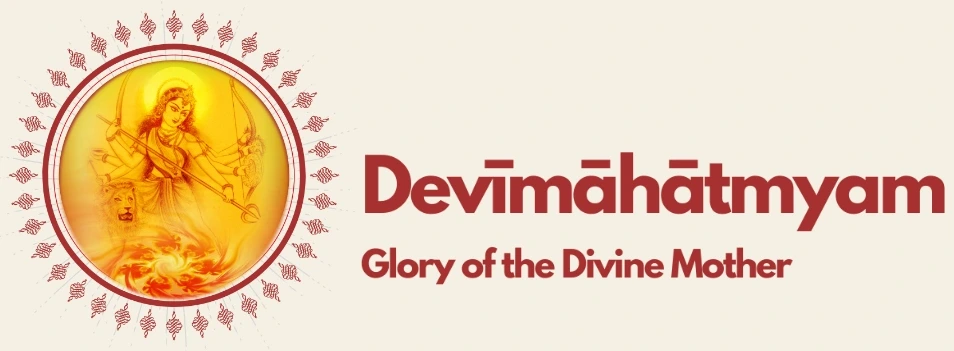Rātrisūktam-Text
One should read Rātri Sūkta before reciting the text of the three episodes and read Devi Sukta immediately after. These two are the 127th and 125th Sūktas in the tenth Mandala of the ṚgVeda. The very fact that Śaptasati, the cream of Tantric literature, has to be recited, prefixed and suffixed by two Vedic Sūktas shows the great importance of the Tantra attaches to Vedic wisdom and tradition.
The Seer of Rātri Sūkta is Kuśika and Rātri Night is the Deity.
The Vedic Seers worshiped the Sun as the Godhead of the supreme Truth and Knowledge dispelling falsehood and ignorance by his rays of illumination. Dawn, Uṣas, is his precursor and she is symbolic of the awakening of the Divine in Man. She opens out vistas of illumination in him and brings him face to face with Sūrya, the God of Truth. But light has no meaning if there has been no darkness, its counter - part. " For the world as we see it has come out of the darkness concealed in darkness, the deep and abysmal flood that covered all things , the inconscient ocean, apraketam salilam; in that non-existence the seers have found by desire in the heart and thought in the mind that which builds up the true existence. This non-existence of the truth of things asat is the first aspect of them that emerges from the inconscient ocean; and its great darkness is the Vedic Night, ratrim jagato nivesanim which holds the world and all its unrevealed potentialities in her obscure bosom.”1
“Out of this non-existence, existence is born “says the Upaniṣad.2 From the inconscient, all the consciousness has sprung up; from the deluge and dissolution, laya, the creation, is manifested; from darkness light has come and from the Night the day dawns. If day is the symbol of divine illumination, night is the symbol of the force of manifestation of that illumination which she keeps in her hidden. All the creation she holds in her as the seed and helps the world towards manifestation; and she is the base, the repository of all the unmanifested worlds.3
1 On the Veda- Sri Aurobindo
2 असद्वा इदमग्र आसीत्। ततो वै सदजायत।
3 अन्तर्निहितसर्वसृष्टिगर्भा जगदाविष्कारप्रयोजिका अनाविष्कृतसमस्तजगदाधारभूता।
Sri Kapali Sastriar in Veda Guptārtha Siddhāñana Bhāṣya (R.V.I.35-1)
The Tantra proclaims her as the great Mother, the Mother who heads the creation and bears in her womb the seed of manifestation. She is the dark night, the great night, the terrible night of delusion Kālarātrir Mahārātrir mohāratiśca daruṇā. She patiently bears Dawn, the divine illumination in her womb and waits for the appropriate time, Kāla to deliver her so that she (Dawn) in turn may deliver up to the worlds ridden by falsehood and ignorance, the Sun of Truth and knowledge. So she is called Kāli. She is the Yoga Nidrā of Viṣṇu, the all-pervasive primordeal principle who withdraws into superconscient sleep on his couch of Infinity, Ananta, spread on the waters of the in conscient ocean, apraketam śalilam. This sleep is the precursor of the great awakening, this withdrawal is the harbinger of a powerful projection of the Godhead in creation and this delusion brings in its wake the supreme enlightment. She is the first, the eldest of all creation, Jyeṣṭha of the daśa mahavidyāṣ. She is the dark mother but not absolutely dark as she bears the light within her. She is Dhūmāvati of smoky hue.
Night is the symbol of the ordinary consciousness in man while the day signified by dawn is the symbol of the divine consciousness. All that is lit up in the day is in the womb of the night; and all that is lit up in the divine consciousness is in the womb of the human consciousness.1 Rātri by her darkness creates fear in the minds of ordinary men.
1. रात्रिशब्देन अस्माकं साधारणी मानुषी प्रज्ञा उपलक्षितेन अन्हा दैवी प्रज्ञा च सङ्केतिते। दिने प्रकाशमानं सर्वं रात्रिगर्भे वर्तते। दैवप्रज्ञायां प्रकाशमानं सर्वं मानुषप्रज्ञागर्भे वर्तते॥
Sri Kapali Sastriar in Veda Guptārtha Siddhāñana Bhāṣya (R.V.I.13-1)
She is terrible dāruṇa with the thieves at large and the beasts of prey like the wolf prowling around. She lets loose all the Niśācaras – the Daityas, the sons of division, the Rākṣasas, the Piśācas, the offsprings of strife and falsehood. But for the aspirant, the night is not so terrible. “The divine flame of the seer - will Agni burns through the dense murk giving light to him who sits afar in its shadow, though not yet kindled, as it shall be at dawn, on a sacrificial altar, yet even so it fulfills on our earth as the lowest and greatest of the gods the will and works of the hidden light in spite of all this enveloping smoke of passion and desire. And the stars shine out and the moon comes at night making manifest the invincible workings of the infinite King.“1
Knowledge and Ignorance are the two facets of the Supreme who transcends both. Day and Night are the obverse and reverse sides of the same eternal infinite. “There is a constant rhythm and alteration of night and dawn illuminations of the Light and periods of exile from it, openings up of our darkness and its settling upon us once more, till the Celestial Birth is accomplished.“2 If this is understood, the significance of the Upanishadic saying will be clear: “One who knows knowledge and ignorance, both together, crosses death by ignorance and attains immortality by knowledge.“3
1. On the Veda- Sri Aurobindo
2. On the Veda- Sri Aurobindo
3. विद्यां चाविद्यां च यस्तद्वेदोभयं सह।
अविद्यया मृत्युं तीर्त्वा विद्ययाऽमृतमश्नुते॥ īśāvāsya upaniṣad
It is quite common in the Veda that the seer extols Uṣas in the Ṛks ascribed to Rātri and extols Rātri in turn in the Ṛks ascribed to Uṣas. He acclaims both as sisters , daughters of Heaven , " Kutsa hymns the two sisters, Immortal with a common lover, agreeing, they move over heaven and earth forming the hue of the light; common is the path of the sisters, infinite; and they range it, the one and the other, taught by the gods; common they, though different their forms.” ( R. V. I. 113-2-3 ) For one is the bright mother of the herds, the other the dark cow, the black, infinite who can yet be made to yield us the shining milk of heaven.”1
1. On the Veda- Sri Aurobindo

